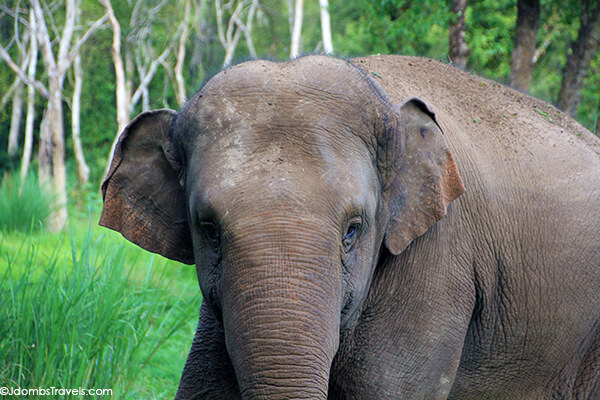
The Golden Triangle Asian Elephant Foundation (GTAEF) was established by John Roberts in 2006.
We sat down to dinner with John on our first night at the resort to learn more about GTAEF and how the elephant encounters at Anantara Golden Triangle are helping conserve Asia’s endangered population of wild Asian elephants. John recounted the tale of how he rescued his first elephant. “A few months later,” he told us, “the same mahout showed up with another elephant asking me to purchase this one too.” It was that moment that John realized he needed to think bigger and that just buying elephants wasn’t the answer. Rescuing elephants would only help those few elephants and the mahouts would simply go about breeding or buying another elephant. GTAEF and the partnership with Anantara was born.
Today the foundation is doing amazing things that not only help the 30 elephants living at Anantara Golden Triangle, but raise money for and help us understand how Asian elephants interact in the wild. Some of their projects include import research studies directed by Dr. Josh Plotnick and the team at Think Elephants International and a program to give working elephants and their mahouts ethical jobs as elephant therapists working with autistic children.
Guests of Anantara Golden Triangle can help support these projects, as well as the care of the elephants, mahouts, and their families at the on-site sanctuary through a number of elephant encounters at the resort.
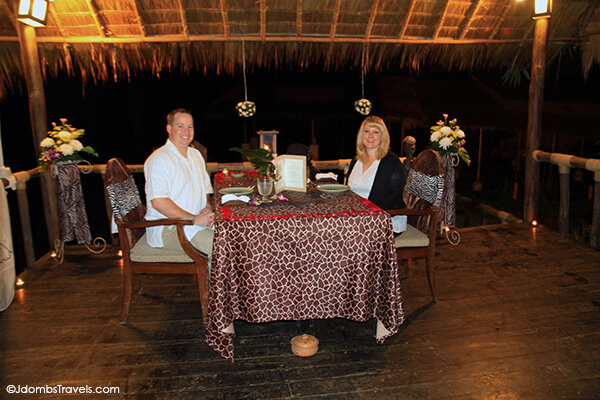
There are baby elephants wandering around behind us!
Dining with Baby Elephants
The baby elephant camp is in the bamboo forest in the grasslands below the resort and you can spend an evening dining in a tree house at the camp while the baby elephants munch on sugar cane alongside you! Start the evening by feeding the elephants sugarcane; happy trunks reaching up to grab the stalks the mahouts have chopped up right out of your hand. Meanwhile, your own personal chef is preparing your meal at the on-site kitchen. Sip a fine South African wine while enjoying the gourmet Thai dinner as the elephants play, throw dirt on themselves, and trumpet just feet away. Finish off the evening saying goodbye to the elephants and making a wish as you light your very own khom fai (sky lantern) and watch it until it floats out of sight.
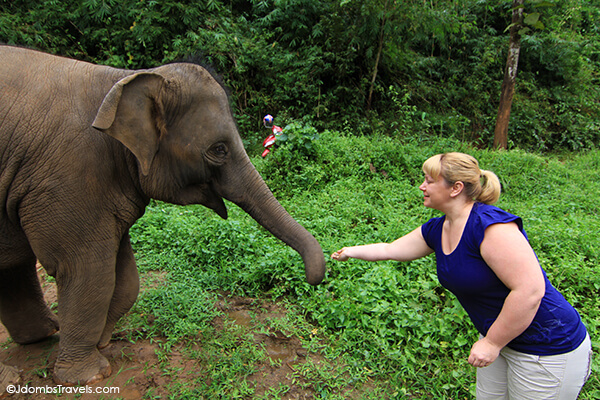
Rewarding baby Ahm with sunflower seeds after she did a great job with her research study
Elephant Researcher Program
Work alongside the research team from Think Elephants International as you help conduct scientific experiments that help us to understand elephant intelligence and behaviors. The research team will explain the experiments and research equipment in detail and then you’ll head out to the field research site to interact with the elephants. Through experiments, like the mirror and cooperation studies that have already been published, you’ll quickly realize that these gentle giants have big personalities that rival their size and that they aren’t so gentle with the research equipment!
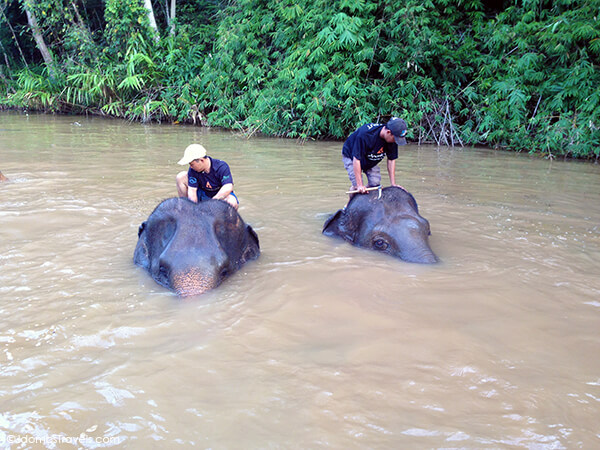
Scrub-a-dub-dub, elephant in the tub!
Mahout Training
Mahout, in its simplest translation, means elephant driver. But mahout-ing is so much more, from providing care to even living alongside the elephant. The relationship between humans and elephants reaches back thousands of years from when kings first used elephants to help fight wars in the dense jungles to elephants working in the logging industry. When logging was banned in 1989 due to destroying natural habitat, mahouts and more than 20,000 unemployed elephants turned to tourism. Mahout-ing is a profession handed down from father to son, and because elephants have such long lifespans of up to 80 years old, the elephant itself was handed down.
In no way will we completely understand the mahout-elephant relationship in just a few days, but the Mahout Training program gives guests a glimpse into it. Alongside the mahouts and Anantara volunteers to help translate, guests can learn some of the over 70 commands mahouts use to train their elephant, help bathe the elephants in the river, and properly learn to ride on the neck of and drive an elephant.
Black Ivory Coffee
Both the rarest and most expensive coffee in the world, Black Ivory comes right from Anantara Golden Triangle. The mahouts’ wives pick the finest Thai Arabica beans and then feed them to some of the elephants. The elephants can’t digest the beans, similar to how people can’t digest corn, and the wives pluck the beans from the elephant dung the next day. The beans are carefully washed and dried. A uniquely tasting coffee is produced in very limited quantities and can only be tasted in a few remote corners of the world.
Read more about Black Ivory: The World’s Most Expensive Coffee
These are just a few of the elephant encounters guests can have at Anantara Golden Triangle. There is plenty more to do, both with and without elephants, at this northern Thai luxury resort! To learn more about the conservation efforts of The Golden Triangle Asian Elephant Foundation, please visit their website.
Our stay was provided by Anantara Hotels & Resorts in order to bring you this story. However, Luxe Adventure Traveler maintains full editorial control of the content published on this site. As always, all thoughts, opinions, and enthusiasm for travel are entirely our own. This article contains affiliate links. When you book on Anantara or Booking.com through our affiliate sites, we earn a small commission at no additional cost to you. It just helps us keep things running here at Luxe Adventure Traveler!
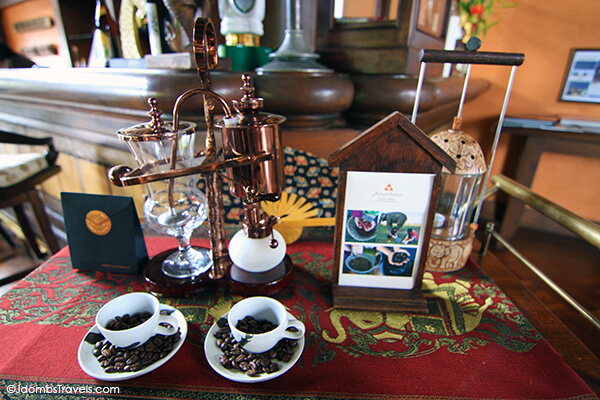
Val-This Way To Paradise says
Wow!! This is awesome…I love the elephant bath picture…I also want to try that coffee….sounds similar to the coffee that I had in Bali that came from civet droppings…it was actually really good!
Jennifer Dombrowski says
It was so much fun hanging out with the elephants every day! Black Ivory coffee is the same concept as the civet coffee. The inventor actually used to work with civets, but didn’t like the way they were treated in order to produce the coffee. At Anantara, the mahouts have the option to participate and making the coffee gives their whole family, elephant included, jobs.
Marlene says
Great experience the pictures were beautiful
Jennifer Dombrowski says
It really was a great experience!
Maria says
Fantastic experience and what a great bonus that the coffee helps everyone… man and beast
Jennifer Dombrowski says
Absolutely, Maria! I’m going to get more into captive elephants and mahout-ing on a post soon because we learned so much.
Devlin @ Marginal Boundaries says
That’s awesome that those coffee beans also benefit the elephants they came from, not sure I like the process though lol, but it eases the blow of such a weighty price knowing that.
Jennifer Dombrowski says
All of the elephant activities benefit the elephants and the mahouts. These are all safe activities for the elephants too and by earning income for their mahouts this way, they aren’t forced to beg on the streets or do unnatural things like perform tricks.
Heather says
I loved our time with the elephants in Thailand! It’s so nice to know there are organizations out there working to protect these amazing animals.
Jennifer Dombrowski says
It’s sad to think that probably within 50 years the Asian Elephant will be extinct. But GTAEF and Think Elephants International are working very hard to understand the cognitive behaviors of elephants, which helps conservations efforts of wild elephants.
Frank says
I just had a vision of an elephant trunk coming over the railing and grabbing something off your plate. Looks like a really fun experience!
Frank (bbqboy)
Jennifer Dombrowski says
Haha! It could happen! Elephants pick up everything with their trunks and they are quite curious.
wandering educators says
How fascinating – I love to learn more about Elephants. What a great experience this was – thanks for sharing!
Jennifer Dombrowski says
Elephants are so fascinating and very smart. It was really interesting to get to interact with them.
Stef says
I love elephants! They are so cute! All these elephant encounters sound great, especially the research program.
Jennifer Dombrowski says
The researcher program was really interesting to participate in! We didn’t realize elephants have such big personalities and are as smart as they are.
Brenda says
I will be staying at Anantara later this year. I can’t wait. I’m planning my trip so I’m wondering if you can tell me how easy it is to get from the hotel to Chiang Rai? Are there public transportation options of some sort from the hotel if I want to explore it on my own? How is the village near the hotel? (Worth seeing?) Thank you!
Jennifer Dombrowski says
Hi Brenda! You’ll love Anantara Golden Triangle! Yes, there are a number of options for getting around from the hotel. The hotel offers a free shuttle several times daily to the Golden Triangle Village and Chiang Saen. We also walked from the Golden Triangle back to the hotel one afternoon. Taxis are really inexpensive and there is a public bus as well.
Anantara offers several tours, including one that does go to Chiang Rai. We opted to hire a taxi for the day and our driver took us to the Hill Tribe Village, the White Temple, an art installation, and Chiang Rai for the night market before depositing us at the airport.
Golden Triangle village is touristy, but fun to go see. There is a huge golden Buddha, the opium museum which is quite interesting, a market set up, a place to get really inexpensive foot massages, and a couple good restaurants to get some really cheap but delicious eats like pad thai and dumplings. You can also get a long tail boat to take you over to the island of Dan Sao in Laos. It’s all touristy, but a fun way to spend an afternoon outside of the resort.